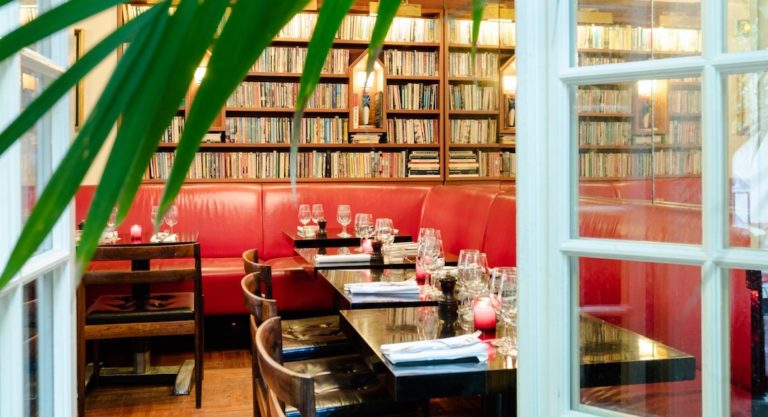Hands up if you’ve found yourself in this situation before: You’re speaking French, chugging along smoothly, when — boom — you hit a roadblock and can’t remember the French equivalent for a word in English.
It’s tempting to toss out an English word using a French accent or add an “é” to the end of the word and hope for the best. Unfortunately, doing so could land you in some sticky situations.
Here’s a list of French and English faux amis, officially known as cognates, that you should know.
1. Passer
What it sounds like in English: to pass
What it means in French: to take
What to use instead: réussir
You treat yourself with a trip to France because you’ve passed the bar exam. On the plane, you tell the handsome français to your left, “J’ai passé le barreau la semaine dernière”. (I took the bar exam last week). He nods politely and turns away. To have better impressed this beau gosse, you should have said, “J’ai réussi le barreau.”
2. Embrasser
What it sounds like in English: A passionate hug between two lovers
What it means in French: To faire la bise (casual kiss on two cheeks to say goodbye and hello)
What to use instead: Avoir envie d’embrasser quelqu’un (the form of the verb matters here!)
Your first night in Paris, you start chatting with cute Rémy on the rooftop of Le Perchoir and exchange numbers. The next day, he wraps up the phone call with, “je t’embrasse.” You’re creeped out by his intensity. If Rémy had actually wanted to passionately embrace you, he would have said, “J’ai envie de t’embrasser.”
3. Engagé
What English word it sounds like: Engaged to be married
What it means in French: Enrolled in something or to have a prior engagement
What to use instead: Fiancé(e)
The next night, you check out the cocktail bar Bluebird and soon enough, the sparks are flying between you and Pierre. You ask Pierre to meet up tomorrow but he declines, saying he’s engagé envers une amie. The nerve of Pierre to lead you on when he’s engaged! Actually, if Pierre were engaged, he would have said “Je me suis fiancé.”
4. Traiteur
What English word it sounds like: Traitor
What it means in French: Caterer
What to use instead: Un traître or une traîtresse
Appalled by Pierre’s behavior, you call him a traiteur and storm off. Pierre stands dumbfounded, wondering why you so angrily seek a caterer at this hour. To better call out an homme infidèle, you should say, “Quel traître!”
5. Célibataire
What English word it sounds like: Celibate
What it means in French: Not married
What French word to use instead: Chaste or vierge
On the first day of your new job, you meet with your manager. Casually she asks if you are célibataire. You can’t believe it! Perhaps only if your new job were in a nunnery would it be conceivable for your employer ask, “Es-tu chaste?”
6. Inviter
What English word it sounds like: To invite
What it means in French: To spot or treat someone
What French word to use instead: Proposer
After the shock of your meeting, you try making friends with new colleagues by inviting them to lunch. You say, “Je vous invite à déjeuner avec moi.” When l’addition arrives, your colleagues hand you the bill. To have saved yourself some euros, you should have said, “Je propose qu’on déjeune ensemble.”
7. Entrée
What English word it sounds like: The main dish of a meal
What it means in French: The appetizer
What to use instead: Le plat
Not only are your pockets emptier than you had anticipated after lunch, so is your stomach! You had ordered the entrée of salade de betterave (beet salad) thinking it was lunch-sized. Next time, check out the plats where you’ll find hearty main dishes such as Paleron de Boeuf.
8. Végétal
What English word it sounds like: Vegetable
What it means in French: Plant
What to use instead: Légume
Since you are a vegetarian, you announce to your colleagues, “J’adore manger les végétales” (I love eating plants). The table goes silent. To start off on the right foot with your colleagues, you should have said, “J’adore les légumes.
9. Commune
What English word it sounds like: A group of people who live together and share possessions
What it means in French: Small administrative regions in France
What to use instead: Communauté
You hear on French radio that there are over 30,000 communes in France. You imagine hippies eating family style in shared houses singing kumbaya. If the radio host were truly referring to American-style communes, he would have said, “Il y a plus de 30,000 communautés autour de la France.’’
10. Préservatif
What English word it sounds like: Preservative (like in food)
What it means in French: Condom
What to use instead: Conservateur
On a health kick and eager to please the parents of the French children you’re babysitting, you announce to them that you abhor préservatifs. To have seemed more responsible, you should have said that you dislike les conservateurs.
11. Excité
What it sounds like in English: Excited
What it means in French: Sexually aroused or overly-energetic
What to use instead: Hâter
You treat yourself to a ballet at Opéra Bastille. At dinner before the show, you tell your waiter that you are excité to see the ballerinas dance. He later ignores your request for a water refill. To have avoided seeming creepy, you should’ve said, “J’ai hâte de regarder le ballet.”
Featured image: Featured image: Stock Photos from Dean Drobot/Shutterstock






